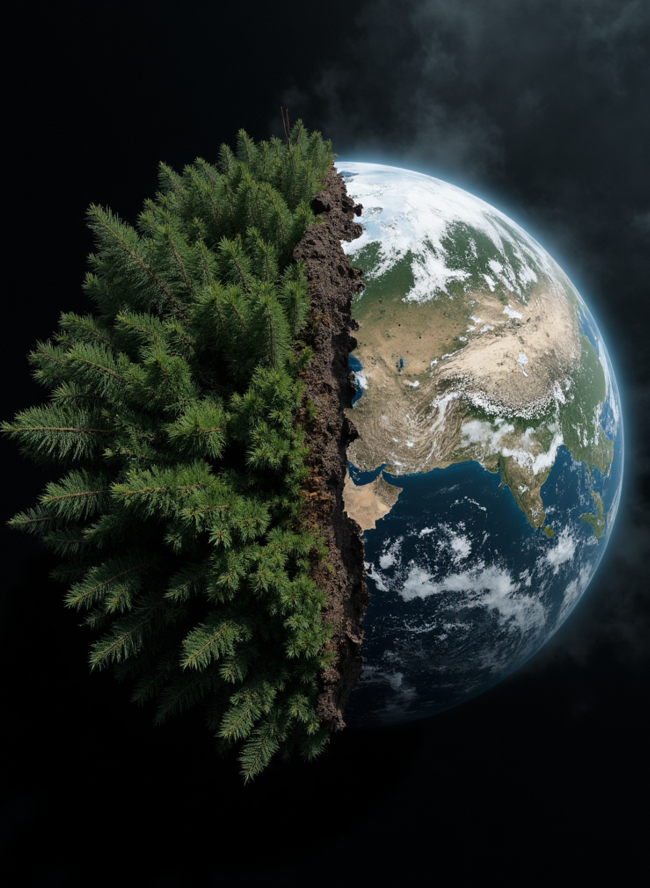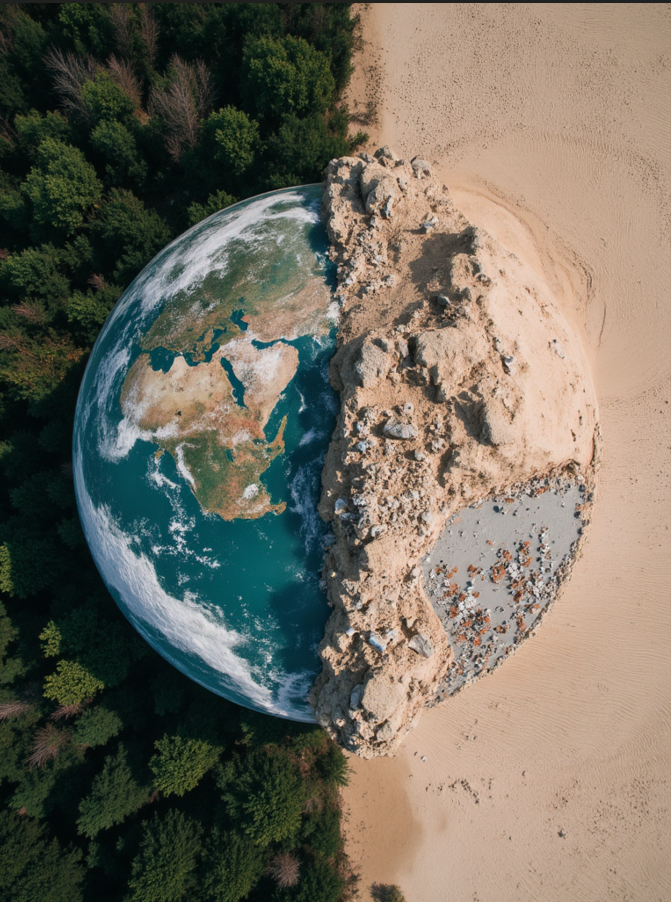By Aureliya
If the planet could clear its throat, now would be the time.
For years, Earth has been sending us increasingly urgent signals — rising global temperatures, record-breaking natural disasters, melting polar ice caps — all pointing to the same truth: our planet is in distress.
While we scroll through our devices and rush through our routines, nature is trying to get our attention. From dried-up rivers to wildfire smoke filling the skies, Earth is waving red flags in every direction.
The question is no longer “Is something wrong?”
It’s this: “Are we truly paying attention?”
Because honestly?
“Ahem… I gave you oceans, trees, clean air — not floods, fires, and plastic-filled beaches.”
If Earth had a voice, that’s exactly what it would say. And if we’re honest, we’ve ignored it for far too long.
🌏 Then vs. Now: A World Transformed
Not too long ago, Earth was a much calmer, greener place. Forests stretched endlessly, air was crisp, rivers ran clear, and wildlife thrived in their natural habitats. People lived in closer harmony with nature, using resources thoughtfully and creating less waste.
Fast forward to today — and the contrast is striking:
-
Forests are being cut down at an alarming rate
-
Rivers are drying up or polluted beyond recognition
-
Air in many cities is unsafe to breathe
-
Many species have gone extinct or are endangered
-
Climate is unstable, swinging between extremes
What was once a thriving, balanced ecosystem has become a planet gasping for relief.
🌡️ Warning Signs: Earth’s SOS
Here are some major environmental indicators that our planet’s health is in danger:
-
Melting Glaciers & Rising Sea Levels: Ice sheets in Greenland and Antarctica are shrinking rapidly. This leads to rising sea levels that threaten low-lying cities and island nations.
-
Extreme Weather Events: From heatwaves in Europe to hurricanes in the Caribbean, climate change is making natural disasters more frequent and intense.
-
Biodiversity Loss: According to the UN, around 1 million species face extinction. Habitat destruction, pollution, and climate shifts are pushing animals to the brink.
-
Air Pollution: The World Health Organization reports that 99% of the global population breathes air that exceeds recommended pollution levels, leading to respiratory issues and early deaths.
These aren’t random events — they’re clear symptoms of a planet under pressure.
🛢️ So What’s Going Wrong?
Humans are putting enormous strain on the Earth through:
-
Deforestation: Millions of hectares of forests are cleared every year for agriculture, mining, and urban expansion. This destroys ecosystems and reduces our planet’s ability to absorb carbon dioxide.
-
Plastic Pollution: Over 8 million tonnes of plastic enter the ocean each year, harming marine life and entering our food chain.
-
Fossil Fuel Dependence: Burning coal, oil, and gas for energy releases greenhouse gases that trap heat in the atmosphere.
-
Overconsumption: From fast fashion to food waste, our throwaway culture is accelerating resource depletion.
-
Industrial Waste: Factories release toxic chemicals into the air, water, and soil, endangering both human and animal life.
-
Electronic Waste: Old gadgets and batteries leak harmful materials into landfills.
Here are the major harmful gases we are releasing:
-
Carbon Dioxide (CO₂): Emitted from fossil fuels and deforestation; it traps heat in the atmosphere.
-
Methane (CH₄): Released from landfills, livestock, and natural gas production; over 25 times more potent than CO₂.
-
Nitrous Oxide (N₂O): Comes from fertilizers and industrial processes; contributes heavily to global warming.
-
Sulfur Dioxide (SO₂): Released by burning coal and oil; causes acid rain and respiratory problems.
-
Ozone (O₃) [at ground level]: Not emitted directly but forms from other pollutants; harmful to breathe and damages crops.
-
Chlorofluorocarbons (CFCs): Previously used in sprays and refrigeration; deplete the ozone layer.
In short, we’re acting like Earth’s resources are unlimited — but they’re not.
💥 How This Affects Us
The consequences of environmental neglect are already impacting people worldwide:
-
Health Risks: Air and water pollution lead to diseases like asthma, cancer, and waterborne illnesses.
-
Economic Impact: Floods, wildfires, and crop failures cause billions in damages and increase food insecurity.
-
Migration & Conflict: Climate stress can force communities to relocate and even spark conflicts over land and water.
-
Daily Life Changes: Unpredictable weather patterns affect school closures, electricity supply, transport, and more.
This isn’t just about the planet — it’s about our survival, safety, and future.
🌱 But There’s Hope (Yes, Seriously)
The best part? It’s not too late. Change is possible — and it starts with small, informed actions:
-
Refuse single-use plastics and carry reusable items like bottles and bags.
-
Support clean energy by using solar-powered devices or backing green initiatives.
-
Save electricity and water — even simple actions like turning off taps and unplugging chargers help.
-
Compost and reduce food waste to lower methane emissions.
-
Speak up! Educate others, join school eco-clubs, or participate in local clean-up drives.
-
Support sustainable brands and local farmers who follow eco-friendly practices.
When individuals act together, big changes happen.
🌳 Been There, Planted That
Let me tell you — nurturing something green and alive is one of the best ways to reconnect with Earth.
Even in simple ways — like sorting waste, avoiding over-packaging, or making posters about environmental awareness — we can show we care.
The planet sees it. 🌿
💬 Final Thought
Earth isn’t asking us to build rocket ships or invent tree-hugging robots — just to be more mindful, more present, and a little less messy.
Fun fact: Scientists say we’re living in the Anthropocene — a fancy term that means humans have changed the planet more than any natural force. , right? We’ve shifted rivers, flattened forests, and even poked a hole in the ozone. (Talk about an overachieving species.)
But here’s the twist: if we have the power to damage it, we also have the power to heal it.
Let’s not wait for a future where kids have to Google “what are trees?” or pay for clean air by the bottle. Let’s act — by reducing waste, demanding cleaner energy, and showing the planet a little love.
Because if Earth sends us another “ahem”... it might come with a lightning bolt.⚡
So, deep breath, small steps, big impact. Let’s give this beautiful blue planet a reason to keep spinning happily — and maybe, just maybe, it’ll stop yelling at us through heatwaves and hurricanes. 🌍💚
✅ My Earth Promise
▢ I’ll carry my own bottle and bag
▢ I’ll switch off what I don’t use
▢ I’ll talk to others about the Earth’s SOS
▢ I’ll reduce waste and plant something green
🌟 Good News
Even though things are tough, people everywhere are fighting back — in the best way:
-
✅ Over 190 countries signed the Paris Climate Agreement
-
✅ Renewable energy is now the cheapest power source in many regions
-
✅ Young people are leading eco strikes, planting trees, and building green apps
The world can change. And guess what? It already is.
“This isn’t just about polar bears. It’s about us.”
“We’re not powerless — we’re powerful and responsible.”

